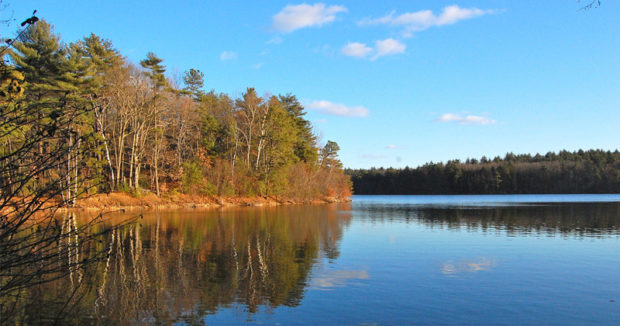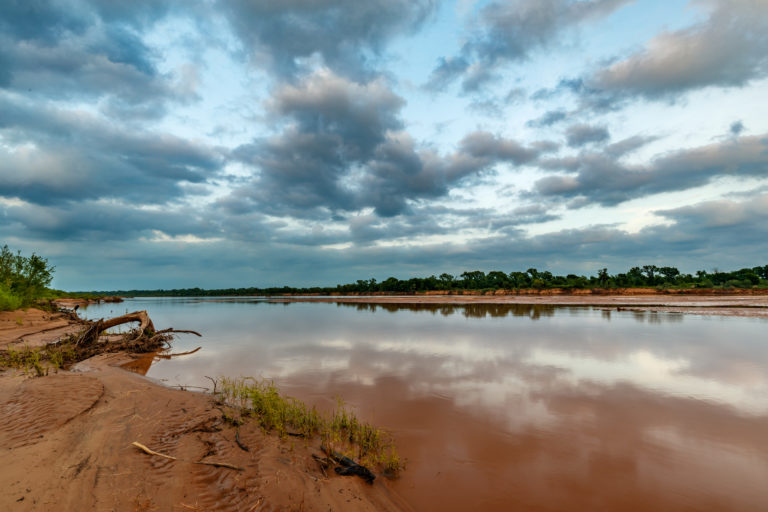You have no items in your cart. Want to get some nice things?
Go shopping
“Our life is frittered away by detail! . . . Simplicity, simplicity.”
Walden, ‘Where I Lived and What I Lived For’.
Such is the gospel of Henry David Thoreau. Transcendentalist, eco-anarchist and wild old man of the woods, Walden is a gargantuan presence in landscape writing that never fails to make the bookshelf of any suburban dad over the age of fifty-five with even a passing interest in rambling.
That said, it’s also one of the most heartfelt and compelling treatises on the rural that continues to resonate within the landscape of nature writing to this day. In July of 1845, Henry David Thoreau packed up his life to live in an isolated cabin on the shores of Walden Pond in Concord, Massachusetts, to escape the irritations of modern living and develop his understanding of the land he resided in both as a writer and as a human being. The literature he created is a moving, heartfelt narrative of his life as a woodlander; and as he fishes and reads, marks the passage of the seasons, we become party to a deep and powerful sense of belonging within the leafy acres. We begin to question our own relationship with the everyday and the modern as Thoreau calls us to find simplicity, simplicity and experience the same urge to remove ourselves from the trappings of conventional urban society for a calmer, greener life based on an earnest relationship with nature.
“I went to the woods because I wished to live deliberately, to front only the essential facts of life, and see if I could not learn what it had to teach, and not, when I came to die, discover that I had not lived. I did not wish to live what was not life, living is so dear; nor did I wish to practise resignation, unless it was quite necessary. I wanted to live deep and suck out all the marrow of life, to live so sturdily and Spartan-like as to put to rout all that was not life, to cut a broad swath and shave close, to drive life into a corner, and reduce it to its lowest terms, and, if it proved to be mean, why then to get the whole and genuine meanness of it, and publish its meanness to the world; or if it were sublime, to know it by experience, and be able to give a true account of it in my next excursion.”
Walden, ‘Where I Lived and What I Lived For’.
But Thoreau’s peace of mind comes at a cost. He lives alone in the landscape, without the influence of modernity: he has no running water, no support network, no amenities closer than the nearest township of Concord, no luxuries and none of the trappings and comforts that the nineteenth century offers–but he is compelled towards the natural like it is a vital, biological part of himself, eschewing all else for it. He argues that it is through this transaction–gaining tranquility through the adoption of an ascetic life, choosing to nourish the soul over garnering profit or achieving societal renown–that we might achieve a life as we were intended to have, a life that is worth the living of it. But this philosophy raises some questions when we come to examine it apropos what it means for our own conceptualisation of Thoreau’s works and how they might still have meaning in a twenty-first century setting.
In the construction of his cabin by Walden Pond, we see a writer whose intent to immerse himself in the rolling natural woodland is motivated by a distinct dissatisfaction with modernity and the compulsion to strip away the trappings of city life and live as he believed nature intended: as the most famous part of Walden reads, seen at the beginning of every eco-tourist vlog since 2005, “I went to the woods because I wished to live deliberately”. Thoreau is dissatisfied with the face of the nineteenth century and what its complications have done to humanity’s precarious balance between enlightenment and the animal, removing them from the natural landscapes they came from and “liv[ing] meanly, like ants […] and our best virtue has for its occasion a superfluous and evitable wretchedness.” In returning to that seminal state within nature, as opposed to living nearby it or, worse, without it, Thoreau makes a statement on the idea of what nature is worth within the landscape of a life. By foregoing the century’s common comforts and embracing the land’s precariousness and danger, he finds something of greater worth than the ease and affluence of his previous existence.
Walden implies that there is an innate desire to pursue wilderness, to expose ourselves to the danger of an unmanaged landscape–but what does that desire come to mean when we complicate it with the notion of the deprivation of comfort as an integral prerequisite? We explore, we ramble, we are inspired by, but we don’t live in the woods. Even were we to pack up completely and live forever alongside the lake, miles from anywhere, we still would live less completely in the landscape than did Thoreau, our cabins replete with the modern comforts of air conditioning, indoor bathing, eBay and Diet Coke. In that, we aren’t truly making the transactional sacrifice that Thoreau believes is key to living a freer existence. Our experience of wild country is for most of us devoid of the negative aspects that define Thoreau’s experiment. We might holiday in the landscape, but we are still foreign to it, landscape-adjacent as opposed to within.
It distances us a little from the text: it cools the ardour a little to think that although we might sit on the same stony shores of Walden Pond, trail our fingers through the shifting pondweed, wander through the arrowy trees that formed the stack and body of the famous cabin in the woods, we are not interior to the landscape in the same way. We might camp out in the woods a night or two, but we can return to the relative ease of our suburban homes whenever we choose. We might spend a day hiking alone in the hinterlands, but a vibrant thread of red in the sunset might then be splattered across social media, connecting us with others across the globe and shattering our supposed isolation. We enjoy the luxuries of emergency support, rescue services and a much greater interconnectivity of transport, the thrilling absence of which gives Walden its almost unique character. In traversing these landscapes we are tourists, rendered other by our modern world, able to observe Thoreau’s anchorite devotion for the sake of his soul but never to emulate it on a level that would bring forth true understanding.
So, then, how may we appreciate what Thoreau’s writing truly means when, by dint of our modern existence, we’re so removed from the deprivation inherent to Thoreau’s chosen life that renders Walden such a compelling piece of landscape writing?
It’s easy to get lost in the romance of the image. The figure of the lone, haggard, bearded man stumping about the perimeter of his rough-hewn homestead, growing beans and gourds for sustenance like some kind of nineteenth-century Hugh Fearnley-Whittingstall is compelling, and we’re drawn into the narrative in a way that we can’t help but look on longingly as he exists without friends, without delicacies, without a LinkedIn profile. There’s something of Christ in the Desert about it, tapping into our eternal fascination with the hermit, the walled-in priestess, and any and all who traipse back into an old high past as corporate life becomes more invasive and vines its way into the home. But what we tend to forget in the haze of this heady New England Mills and Boon is that Henry David Thoreau–grandfather of landscape writing, builder of cabins and naturalist champion of all things pious and good–wasn’t quite the ascetic heart of the wilderness that pop literature implies.
Henry David Thoreau was an educated white man of no small means, and although that doesn’t indicate that he never experienced danger or deprivation in his time on Walden Pond, it means that his choice in doing so might not be the high-stakes gambit for his soul that sells copy after copy, year after year.
Upon graduating from university, the young Thoreau met fellow writer Ralph Waldo Emerson. The older man took a patron-like interest in him, and from there Thoreau’s literary aspirations grew. Whilst Thoreau focused his attentions on the natural from the very beginning, it was during this period that Emerson began introducing him to key players in what would solidify as the wider Transcendentalist movement, finding him employment in Emerson’s household and opening doors in the publishing industry that would have otherwise remained shut to the young writer. The pair often talked about landscape, advocating a return to the cradle of nature in their writings and championing the green and the good above all things modern and canny. Eventually, and with Emerson’s blessing, Henry David Thoreau left to embark upon his venture of simple living in the woods.
What is often occluded, however, is that his homely plot by the side of Walden pond was actually situated on a swathe of land owned by Ralph Waldo Emerson, far from the heart of the forest. Likewise, the pretty dell that would become the setting for Thoreau’s magnum opus of solitude was less than two miles from the Emerson family home. And whilst the young writer did live simply–growing what he needed, buying only what he could neither build nor propagate–he wasn’t entirely unsupported by the society he reportedly sought to remove himself from: upon being apprehended by a tax collector and promptly jailed, Thoreau’s aunt bailed him out with a vast sum equal to six years of poll tax avoidance. We must ask ourselves: does there truly exist risk, danger and deprivation if, in a heavy snowfall, one has the option to wrap up and head to Emerson’s house for Saturday tea? Does one really risk the penalties of civil disobedience if, although against the writer’s wishes, extended family may rally to pay all debts and release one from the life-altering ramifications of a prison sentence? The genius of Walden remains unassailable, but the reality of Thoreau’s ascetic experiment is that the romance by far outweighs the reality: the stakes were relatively low, the networks of modernity still present. Thoreau, like us, was a tourist in an antique land.
Yet it has no bearing on his art.
Walden is characterised by its open-faced affection, and although its affected rustic heart may only be a stone’s throw from Emerson’s front porch, the work remains a triumph of nature writing that unlocks the green potential of the imagination and indeed compels us to simplify. The way Thoreau regards the forest-scape is moving, finding multitudes in the way his sun catches in groundswell, in the scurrying of his rabbits and the swaying of his ferns. The whole text sears with a vast, many-levelled appreciation of the processes of nature and season. It’s a labour of love in the purest sense; and although it may sometimes be difficult to share Thoreau’s philosophy, we can share his fascination, his great love of the land and his small part in the cycles that dictate his existence.
It is easy to look at Thoreau’s experience of landscape and feel exiled from the text, to believe that there’s no modern way to live in such proximity to nature, but the truth is that Walden was motivated by love of the landscape and a desire to ‘get away from it all’ in much the same way that we book secluded Airbnbs in the Lake District for a social media detox. Thoreau too had the option to go home–yet he chose not to, instead writing of his simple life in a way that, even two centuries later, continues to drive us into the woods, into the wildernesses, to consider the nature of what is vital as opposed to what is simply expected of us in our lives.
Walden is far from a philosophical masterpiece–contradictory, self-righteous at times, complex in its innovation and obfuscating meaning behind the lengthiest and most arduous passages–but it stokes us to passion. We too might venture out into the woods with the intention of living more deliberately, and even now the work inspires us to explore, experiment and deviate from the norm, as Thoreau himself did, to attain a richer understanding of ourselves.
About Hannah Parkes Smith
Dr. Hannah Parkes Smith is a writer and journalist from the North of England. She finished her PhD in 2018 at Queen Mary University of London and writes on landscape and culture, poetry 1920-1970 and anything a little bit spooky.




